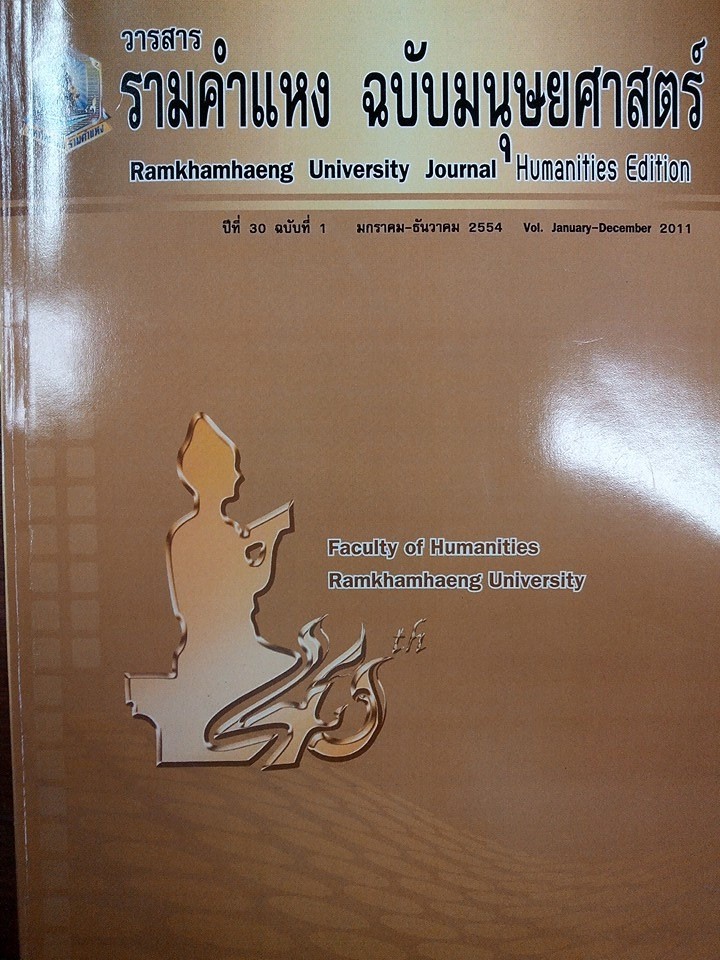วัฒนธรรมผสานผ่านคลองแสนแสบสู่ทุ่งบางกะปิ: มิติสังคมวัฒนธรรม From Klong Saensaeb to the Plain of Bangkapi: Socio-Cultural Dimensions of Institutional Acculturation
Main Article Content
บทคัดย่อ
Abstract
This study depicts the socio-cultural changes in Bang-kapi as informed by people in the community. The sociological concepts are applied to analize both physical and socio-cultural changes. The researchers employed the in-depth interview technique to study the acculturation in three Bang-kapi communities: Klong-chan, where most of population are Buddhist Thai; Huamark, Muslim Thai; and Wat klang, both Buddhist and Muslim Thai. The duration of the study ranges from the earliest settlement of the community to the present. The findings encapsulate the socio-cultural changes in five institutions: family, economic, political, religious, and educational. Regarding the family institution, more nuclear families than extended families are observed in both Buddhist Thai and Muslim Thai communities. Regarding economic institution, with the advent of societal changes, the former dominant agricultural economy has been challenged by the latter occupational diversity. With regard to the political institution, the tradition that senior citizens were revered as community leaders has been
supplanted by more formal leaders. Regarding religious institution, Buddhist Thai and Muslim Thai have become acculturated because cross-cultural marriages are notably acknowledged by family members and kinships. As regards educational institution, both Buddhist Thai and Muslim Thai reinforce their younger generations to pursue their studies at the university level
more than before. This trend corresponds with the development of educational system in Thailand at present. The repercussion of changes is caused by the socio-economic development as well as the proliferation of population size. As a result, the former primary relationship in the community has gradually become the secondary relationship. Villagers become more individualistic; nevertheless, the milieu of harmonious co-existence is still discernible. Hence, in order to strengthen the community, future sustainable developments should accentuate the acculturation, the cultural identity preservation, and the cultural inheritance to younger generations.
This study depicts the socio-cultural changes in Bang-kapi as informed by people in the community. The sociological concepts are applied to analize both physical and socio-cultural changes. The researchers employed the in-depth interview technique to study the acculturation in three Bang-kapi communities: Klong-chan, where most of population are Buddhist Thai; Huamark, Muslim Thai; and Wat klang, both Buddhist and Muslim Thai. The duration of the study ranges from the earliest settlement of the community to the present. The findings encapsulate the socio-cultural changes in five institutions: family, economic, political, religious, and educational. Regarding the family institution, more nuclear families than extended families are observed in both Buddhist Thai and Muslim Thai communities. Regarding economic institution, with the advent of societal changes, the former dominant agricultural economy has been challenged by the latter occupational diversity. With regard to the political institution, the tradition that senior citizens were revered as community leaders has been
supplanted by more formal leaders. Regarding religious institution, Buddhist Thai and Muslim Thai have become acculturated because cross-cultural marriages are notably acknowledged by family members and kinships. As regards educational institution, both Buddhist Thai and Muslim Thai reinforce their younger generations to pursue their studies at the university level
more than before. This trend corresponds with the development of educational system in Thailand at present. The repercussion of changes is caused by the socio-economic development as well as the proliferation of population size. As a result, the former primary relationship in the community has gradually become the secondary relationship. Villagers become more individualistic; nevertheless, the milieu of harmonious co-existence is still discernible. Hence, in order to strengthen the community, future sustainable developments should accentuate the acculturation, the cultural identity preservation, and the cultural inheritance to younger generations.
Article Details
รูปแบบการอ้างอิง
อังควานิช ด., & นิจรันดร์ น. (2014). วัฒนธรรมผสานผ่านคลองแสนแสบสู่ทุ่งบางกะปิ: มิติสังคมวัฒนธรรม From Klong Saensaeb to the Plain of Bangkapi: Socio-Cultural Dimensions of Institutional Acculturation. วารสารรามคำแหง ฉบับมนุษยศาสตร์, 30(1), 59–82. สืบค้น จาก https://so05.tci-thaijo.org/index.php/huru/article/view/27884
ประเภทบทความ
บทความวิจัย

อนุญาตภายใต้เงื่อนไข Creative Commons Attribution-NonCommercial-NoDerivatives 4.0 International License.
ประกาศลิขสิทธิ์จะปรากฏในเกี่ยวกับวารสาร ควรอธิบายสำหรับผู้อ่านและผู้เขียนว่าเจ้าของลิขสิทธิ์เป็นผู้เขียนวารสารหรือบุคคลที่สาม ควรรวมถึงข้อตกลงการอนุญาตเพิ่มเติม (เช่นใบอนุญาตครีเอทีฟคอมมอนส์) ที่ให้สิทธิ์แก่ผู้อ่าน (ดูตัวอย่าง) และควรให้วิธีการรักษาความปลอดภัยหากจำเป็นสำหรับการใช้เนื้อหาของวารสาร


